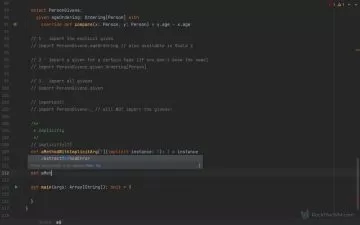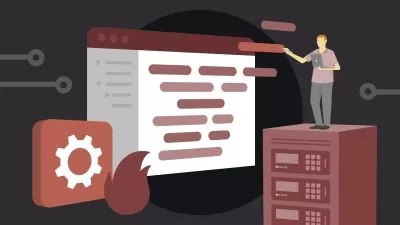COBOL Complete Reference Course!
Topictrick Education
11:21:39
Description
COBOL Bootcamp: A Comprehensive Training Program.
What You'll Learn?
- COBOL syntax and basic programming concepts, including data types, variables, arithmetic operations, and control structures.
- COBOL program design principles, including modularization, program structure, and best practices for writing efficient and maintainable COBOL code.
- Advanced topics in COBOL, such as tables processing, calling external subprograms, sort and merge operations, and working with XML and JSON data.
- Working with COBOL programs in a mainframe or non-mainframe environment, such as Micro Focus COBOL, including compilation, execution, and debugging techniques.
- Database integration with COBOL, including interfacing with DB2, IMS, and CICS. Exception handling in COBOL programs, including handling of I/O errors.
- Tips and techniques for troubleshooting and debugging COBOL programs, and understanding common COBOL coding errors and their resolutions.
- File handling in COBOL, including sequential and random file access, record structures, and file organization.
- Quizzes after each section to reinforce learning and test understanding.
- Practical hands-on exercises and projects to apply COBOL concepts in real-world scenarios and develop practical programming skills.
- Job interview preparation, including common COBOL interview questions, best practices for answering them, and guidance on how to succeed in the job interviews.
Who is this for?
More details
DescriptionAre you looking to learn COBOL programming from scratch or to improve your existing skills? Look no further than the COBOL Complete Reference Course – the most comprehensive and up-to-date COBOL programming course on the market.
Welcome to our comprehensive COBOL Complete Reference Course! Whether you're a beginner looking to learn a new programming language or an experienced developer seeking to enhance your skills, this course has something for everyone interested in COBOL.
COBOL, or Common Business-Oriented Language, is a powerful and widely-used programming language that has been the backbone of many business applications and legacy systems for decades. In this course, you will gain a solid understanding of COBOL, its history, evolution, and basics.
The course begins with an overview of COBOL, including its origins, history, and relevance in modern business applications. You will learn about the syntax and structure of COBOL programs, including COBOL data types, variables, constants, and basic program structure, and COBOL web services formats such as XMLÂ and JSON. Through practical examples and code snippets, you will gain hands-on experience in writing COBOL programs.
Additionally, the course explores advanced topics such as file handling and data manipulation in COBOL, including reading and writing sequential and random files, file organization, and file handling techniques. You will also learn about integrating COBOL programs with databases such as DB2, or IMS, and working with SQL and embedded SQL in COBOL programs.
The course also covers other advanced COBOL concepts such as subprograms, complex data structures, error handling, debugging, performance tuning, and best practices in COBOL programming. You will gain a comprehensive understanding of COBOL development, including legacy system modernization, and how COBOL integrates with modern technologies and platforms.
As part of the course, you will also learn about COBOL compilers and Integrated Development Environments (IDEs) commonly used in COBOL development. Upon completion of this course, you will be equipped with the knowledge and skills needed to develop COBOL programs for various business applications, legacy systems, and modernization initiatives.
Whether you are a student, a professional, or an aspiring COBOL developer, this course provides a comprehensive reference for mastering COBOL and excelling in the competitive COBOL job market.
Why Learn COBOL?
COBOL (Common Business-Oriented Language) is a high-level programming language that has been used for decades in industries such as finance, banking, insurance, and government. Despite its age, COBOL remains a vital part of many critical business systems, and there is currently a high demand for COBOL programmers in the job market.
What You Will Learn.
In the COBOL Complete Reference Course, you will learn all the essential skills and concepts needed to become a proficient COBOL programmer. This includes:
Understanding the basics of COBOL syntax and structure.
Writing, compiling, and debugging COBOL programs.
Working with data structures, files, and database systems, and web service interfaces.
Developing programs for real-world business applications.
Designing, building, and testing a COBOL program.
COBOL File and exception handling, and database integration.
Course Features.
The COBOL Complete Reference Course is designed to be accessible and engaging for learners of all skill levels. Here are some of the features that set us apart:
Comprehensive Curriculum.
Our course curriculum covers all the key topics and concepts that you need to master COBOL programming. From basic syntax to advanced database programming techniques, COBOLÂ web services, etc you will learn everything you need to succeed in the world of COBOL.
Expert Instruction.
Our instructors have experienced COBOL programmers with years of industry experience. They will guide you through each lesson, providing clear explanations and practical examples to help you understand and apply the concepts covered in the course.
Hands-On Learning.
We believe that the best way to learn programming is by doing it yourself. That's why the COBOL Complete Reference Course includes plenty of hands-on exercises and projects, giving you the opportunity to apply your new skills in a real-world context.
Flexible Learning Options.
Whether you prefer to learn at your own pace or in a structured classroom setting, we have the perfect learning option for you. Our course is available both online and in-person, with flexible scheduling options to fit your busy lifestyle.
Who Should Take This Course?
The COBOL Complete Reference Course is designed for anyone who wants to learn COBOL programming, regardless of their prior experience or background. This includes:
Beginners who want to learn COBOL from scratch
Experienced programmers who want to expand their skill set
Business professionals who want to understand COBOL code and systems better.
Start Your COBOL Journey Today
Don't miss out on this opportunity to become a skilled COBOL programmer and take advantage of the high demand for COBOL skills in the job market. Enroll in the COBOL Complete Reference Course today and start your journey toward a successful career in programming.
Note: This course does not include Mainframe IDs. You must arrange your own Mainframe ID. For a list of topics covered, please refer to the content section. It is a pleasure to have you as a student. I would appreciate it if you would leave feedback because your feedback is important to us!
Tags: #COBOLProgramming, #COBOLCourse, #COBOLTraining, #ProgrammingEducation, #CareerDevelopment, #BusinessProgramming, #MainframeProgramming, #LegacySystems, #DatabaseProgramming, #DataManagement, #StructuredProgramming, #OnlineLearning, #topictrick
Who this course is for:
- Beginners who are new to programming and want to learn COBOL.
- Individuals with some programming experience who want to expand their skills with COBOL.
- Professionals who need to work with COBOL in their job roles, such as mainframe developers or legacy systems maintainers.
- Those interested in gaining knowledge about COBOL for career advancement or job opportunities.
- Anyone looking to enhance their understanding of COBOL, a widely used programming language in the business and finance sectors.
Are you looking to learn COBOL programming from scratch or to improve your existing skills? Look no further than the COBOL Complete Reference Course – the most comprehensive and up-to-date COBOL programming course on the market.
Welcome to our comprehensive COBOL Complete Reference Course! Whether you're a beginner looking to learn a new programming language or an experienced developer seeking to enhance your skills, this course has something for everyone interested in COBOL.
COBOL, or Common Business-Oriented Language, is a powerful and widely-used programming language that has been the backbone of many business applications and legacy systems for decades. In this course, you will gain a solid understanding of COBOL, its history, evolution, and basics.
The course begins with an overview of COBOL, including its origins, history, and relevance in modern business applications. You will learn about the syntax and structure of COBOL programs, including COBOL data types, variables, constants, and basic program structure, and COBOL web services formats such as XMLÂ and JSON. Through practical examples and code snippets, you will gain hands-on experience in writing COBOL programs.
Additionally, the course explores advanced topics such as file handling and data manipulation in COBOL, including reading and writing sequential and random files, file organization, and file handling techniques. You will also learn about integrating COBOL programs with databases such as DB2, or IMS, and working with SQL and embedded SQL in COBOL programs.
The course also covers other advanced COBOL concepts such as subprograms, complex data structures, error handling, debugging, performance tuning, and best practices in COBOL programming. You will gain a comprehensive understanding of COBOL development, including legacy system modernization, and how COBOL integrates with modern technologies and platforms.
As part of the course, you will also learn about COBOL compilers and Integrated Development Environments (IDEs) commonly used in COBOL development. Upon completion of this course, you will be equipped with the knowledge and skills needed to develop COBOL programs for various business applications, legacy systems, and modernization initiatives.
Whether you are a student, a professional, or an aspiring COBOL developer, this course provides a comprehensive reference for mastering COBOL and excelling in the competitive COBOL job market.
Why Learn COBOL?
COBOL (Common Business-Oriented Language) is a high-level programming language that has been used for decades in industries such as finance, banking, insurance, and government. Despite its age, COBOL remains a vital part of many critical business systems, and there is currently a high demand for COBOL programmers in the job market.
What You Will Learn.
In the COBOL Complete Reference Course, you will learn all the essential skills and concepts needed to become a proficient COBOL programmer. This includes:
Understanding the basics of COBOL syntax and structure.
Writing, compiling, and debugging COBOL programs.
Working with data structures, files, and database systems, and web service interfaces.
Developing programs for real-world business applications.
Designing, building, and testing a COBOL program.
COBOL File and exception handling, and database integration.
Course Features.
The COBOL Complete Reference Course is designed to be accessible and engaging for learners of all skill levels. Here are some of the features that set us apart:
Comprehensive Curriculum.
Our course curriculum covers all the key topics and concepts that you need to master COBOL programming. From basic syntax to advanced database programming techniques, COBOLÂ web services, etc you will learn everything you need to succeed in the world of COBOL.
Expert Instruction.
Our instructors have experienced COBOL programmers with years of industry experience. They will guide you through each lesson, providing clear explanations and practical examples to help you understand and apply the concepts covered in the course.
Hands-On Learning.
We believe that the best way to learn programming is by doing it yourself. That's why the COBOL Complete Reference Course includes plenty of hands-on exercises and projects, giving you the opportunity to apply your new skills in a real-world context.
Flexible Learning Options.
Whether you prefer to learn at your own pace or in a structured classroom setting, we have the perfect learning option for you. Our course is available both online and in-person, with flexible scheduling options to fit your busy lifestyle.
Who Should Take This Course?
The COBOL Complete Reference Course is designed for anyone who wants to learn COBOL programming, regardless of their prior experience or background. This includes:
Beginners who want to learn COBOL from scratch
Experienced programmers who want to expand their skill set
Business professionals who want to understand COBOL code and systems better.
Start Your COBOL Journey Today
Don't miss out on this opportunity to become a skilled COBOL programmer and take advantage of the high demand for COBOL skills in the job market. Enroll in the COBOL Complete Reference Course today and start your journey toward a successful career in programming.
Note: This course does not include Mainframe IDs. You must arrange your own Mainframe ID. For a list of topics covered, please refer to the content section. It is a pleasure to have you as a student. I would appreciate it if you would leave feedback because your feedback is important to us!
Tags: #COBOLProgramming, #COBOLCourse, #COBOLTraining, #ProgrammingEducation, #CareerDevelopment, #BusinessProgramming, #MainframeProgramming, #LegacySystems, #DatabaseProgramming, #DataManagement, #StructuredProgramming, #OnlineLearning, #topictrick
Who this course is for:
- Beginners who are new to programming and want to learn COBOL.
- Individuals with some programming experience who want to expand their skills with COBOL.
- Professionals who need to work with COBOL in their job roles, such as mainframe developers or legacy systems maintainers.
- Those interested in gaining knowledge about COBOL for career advancement or job opportunities.
- Anyone looking to enhance their understanding of COBOL, a widely used programming language in the business and finance sectors.
User Reviews
Rating
Topictrick Education
Instructor's Courses
Udemy
View courses Udemy- language english
- Training sessions 124
- duration 11:21:39
- Release Date 2023/06/06










